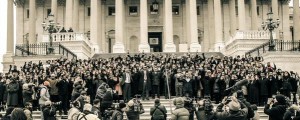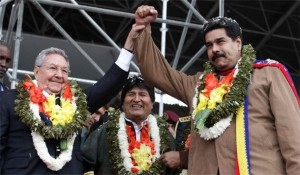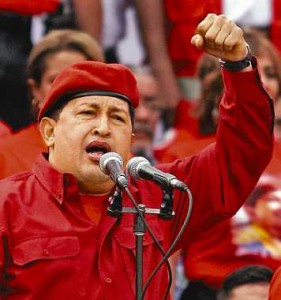http://mltoday.com/when-will-the-cops-stop-killing-us
- By David Michael Smith
November 6, 2014
The fatal shooting of Michael Brown, an unarmed 18-year-old Black man, by Darren Wilson, a White police officer, in Ferguson, Missouri on August 9 outraged scores of millions of people throughout the United States. It is difficult to see how the killing of an unarmed individual by police could be justified under virtually any circumstances. And in Ferguson, the massive military response to the subsequent protests, the pointing of semi-automatic rifles at unarmed protesters, the misuse of rubber bullets and tear gas, the physical threats against demonstrators, and the unlawful arrests of journalists were unconscionable. Although politicians of all stripes and highly paid pundits have criticized those who threw rocks and bottles at law enforcement officers in Ferguson, as Robert Stephens II wrote in Jacobin, angry demonstrators were “far from a mindless, violent mob.†They were simply, in the words of one young Black man, “fed up.†So were the scores of thousands of people who participated in subsequent protests across the country.
Protests have continued every day since August 9 in Ferguson and St. Louis County. The uprising has led to Ferguson police Chief Thomas Jackson apologizing to the Brown family, three local police officers being fired or forced into retirement for misconduct, and Ferguson cops beginning to wear body cameras.
In addition, some politicians are demanding that area police departments recruit more people of color. A local grand jury is considering possible charges against Wilson, and two related U.S. Department of Justice investigations have also been launched. But while several witnesses have reported that Brown was killed while his hands were up in the air, most people in the community doubt Wilson will be brought to justice by the local grand jury or the Department of Justice.
From Los Angeles to Chicago to New York, demonstrators seeking justice for Brown and his family have expressed the same pessimism and vowed to create a new mass movement to end the continuing scourge of police brutality in America once and for all.
The imperative need for such a mass movement has been clear for a long time. Popular calls for collective political action to stop cops from killing and brutalizing innocent people have been issued regularly for the past half-century. Tragically, unjustified police violence has persisted despite robust but intermittent opposition for decades, and progress toward reining in killer cops has been limited.
In the wake of the August 9 tragedy in Ferguson, it is time for those of us who are committed to helping end police crimes to answer two vital, interrelated questions. How significant and how systemic is police brutality? And what will it take to stop the cops from killing us? Developing a realistic answer to the first question is essential for developing a realistic answer to the second question. And getting both of these questions right—in practice as well as in theory—is indispensable for the development of a popular movement that can end murders, physical abuse, racism, and other misconduct by police officers.
Police in the United States have historically played—and still play today—a central role in the subjugation of workers, people of color, critics of the existing social order, and the population as a whole. As Victor E. Kappeler, Gary Potter, and other researchers have pointed out, local and state governments created America’s first law enforcement forces in order to protect the economic order developed by European slaveowners and capitalists and to control the behavior of workers and people of color.
European settlers from New England to St. Louis launched constable and police patrols to “protect†Whites against Native people. Plantation owners in the southern states initiated slave patrols to enforce discipline, monitor those in bondage, and apprehend escaped slaves. Merchants and industrialists supported the creation of police departments in New York, Boston, Philadelphia, Chicago, and other major cities in the 1840s and 1850s in order to exert social control over the growing numbers of impoverished workers and immigrants, and to prevent any “disorder†they might cause.
The proliferation of police departments across the country led to a great deal of unlawful violence, criminal corruption, labor suppression, and virulent racism by cops. The term “police brutality†first appeared in the New York Times in 1893, but Americans from diverse backgrounds had already been complaining about police crimes for decades.
In addition, as workers struggled to form unions and achieve workplace reforms, cops demonstrated that they would “serve and protect†big business. Police, state militias, and soldiers killed about 100 workers during the Great Railroad Strike in Pennsylvania and other states in 1877. Chicago police killed several workers at Haymarket Square in 1886. Police and other armed agents of the state killed almost 200 workers in various labor struggles between 1902 and 1904 alone. Police killed about a dozen members of the Industrial Workers of the World near Seattle in 1916. Local and state police killed dozens of workers in the multi-state Steel Strike of 1919. Chicago police killed ten striking steel workers in 1937. As Philip Taft and Philip Ross have observed, the U.S. had the “bloodiest and most violent labor history of any industrial nation in the world.â€
Local police forces and the Ku Klux Klan presided over an even more horrific reign of terror against African Americans in the South for almost a century after the Civil War. Police led a racist massacre which killed 46 African Americans and 2 White supporters in Memphis in 1866. Between the 1880s and the 1940s, about 5000 Black people were lynched by White racists, often with the approval of local law enforcement authorities. In 1917, White cops and vigilantes killed 39 African Americans in East St. Louis.
The same year, Houston police killed several solders from the all-Black Third Battalion of the Twenty-fourth Infantry assigned to Camp Logan. When 100 armed members of the Third Battalion marched into Houston, a firefight left 16 dead Whites (4 of whom were cops) and 4 dead Black soldiers. The federal government executed 19 Black soldiers and sent 50 others to prison for life. As Professor Benjamin Johnson has pointed out, Texas Rangers killed as many as 5000 Mexican insurgents and Tejanos during the second decade of the 20th century. Racist violence by cops also led to uprisings by Blacks in New York City in 1935 and 1943 and by Latinos in Los Angeles in 1943 and 1951.
By the 1960s, labor militancy had largely abated. But the historically unprecedented social upheavals against racism and the Vietnam War were met with unrelenting violence. Local Sheriff’s deputies murdered three civil rights activists near Philadelphia, Mississippi in 1964. State troopers shot a Black man to death during a voting rights march in Alabama in 1965. Between 1964 and 1968, police brutality sparked uprisings by people of color in Philadelphia, Detroit, Newark, Los Angeles, and other cities, which resulted in the deaths of more than 200 people, primarily Blacks and Latinos. Scores more died in the uprisings which erupted in more than 100 cities after the assassination of Dr. Martin Luther King, Jr. in April 1968.
A few months later, cops beat and brutalized hundreds of people protesting against the Democratic Party National Convention. In 1969, Chicago police assassinated Black Panther Party leaders Fred Hampton and Mark Clark. In May 1970, Ohio National Guardsmen killed four Kent State University students and Mississippi police killed two Jackson State University students protesting against the invasion of Cambodia. By 1972, police in several cities had killed about 35 Black Panther Party activists.
In recent decades, unjustified police violence has continued to plague the country. In 1985, a Philadelphia police helicopter dropped a bomb on the Black organization MOVE’s house and killed five children and six adults. In 1992, after a jury acquitted four cops of assault and excessive force against Rodney King, an uprising in Los Angeles led to 53 deaths. In 1998, New York City cops beat and sodomized Abner Louima with a broom stick. In 2001, after 15 Black men had been killed by local police in recent years, mass protests and street violence erupted in Cincinnati. Police killings of Eli Escobar in Houston in 2003, of Sean Bell in New York City in 2006, and of Oscar Grant in Oakland in 2009 attracted national publicity. Between 2000 and 2009, New York City paid almost $1,000,000,000 to resolve lawsuits involving police misconduct.
Between 2008 and the present, Houston police have killed 10 unarmed people and wounded more than 20 unarmed people. Since 2010, Albuquerque cops have wrongfully killed 26 people, and related litigation has cost the city about $30,000,000. In 2011-2012, police brutalized and injured Occupy protesters in New York City, Chicago, Los Angeles, and other cities.
Popular opposition has forced the US Department of Justice to investigate police departments in Newark, Pittsburgh, Washington DC, New Orleans, Detroit, Los Angeles, Seattle, and about 20 other cities and counties.
Unfortunately, federal intervention has not ended unjustified police violence in these jurisdictions. And it is neither an accident nor an oversight that no comprehensive database on wrongful police killings currently exists. Most politicians across the country still deny the scope and significance of police brutality. However, Amnesty International, Human Rights Watch, the American Civil Liberties Union, the National Association for the Advancement of Colored People, the League of United Latin American Citizens, and many other organizations have strongly criticized police brutality. And the United Nations Committee on the Elimination of Racial Discrimination (CERD) recently declared, “The excessive use of force by law enforcement officials against racial and ethnic minorities is an ongoing issue of concern and particularly in light of the shooting of Michael Brown…This is not an isolated event and illustrates a bigger problem in the United States.â€
When will the cops stop killing us? The historical record suggests that the answer is: When we, the people, make them stop—and not until then. Although the limited reforms enacted in recent decades or demanded today have merit, they have failed and will continue to fail to prevent unjustified police violence. The perennial argument for improved training cannot be disputed, but changes in training have been going on for decades and have not significantly reduced police crimes in most cities.
Similarly, the need to recruit more people of color in many police departments is an urgent imperative. But most police officers in New York City, Washington DC, Chicago, New Orleans, and Los Angeles are people of color today, yet these departments continue to kill, maim, and mistreat innocent people on a regular basis. Recent calls for all police officers to wear body cameras rightly point to an impressive decline in police use-of-force and civilian complaints during a study in Rialto, California. But while this new technology is promising, its effectiveness depends on not turning off the cameras or manipulating the video record, as some cops in New Orleans and other cities have already done.
Even videotape evidence of police crimes sometimes fails to ensure that the perpetrators receive justice. The videotaped beating of Rodney King in Los Angeles did not lead to a conviction of the police officers involved in their first trial in 1992. The videotaped shooting of a mentally ill, homeless man in Albuquerque did not even result in the police officers involved being indicted last March. And the videotaped assault and illegal chokehold that killed Eric Garner in Staten Island last July may not lead to an indictment of the police officer involved either, though a public opinion survey has found that 64% of voters in New York City support an indictment.
The virtual impunity with which some cops commit violent crimes against innocent people is a reminder that genuine, consistent accountability for these perpetrators is tragically lacking in the criminal justice system. Although more than 100 citizen review boards exist across the country today, they are generally ineffective, in part because most of them do not have subpoena powers and independent authority to authorize prosecutions.
Local prosecutors, grand juries, trial juries, and political leaders from both major parties share responsibility for the persistence of police brutality. Prosecutors work closely with police and will not usually seek indictments against cops accused of killing or injuring citizens. Grand juries are often composed of older, more conservative White men who are more inclined to rationalize the commission of crimes by officers in the line of duty. Houston’s own “pick-a-pal†method of empaneling grand jurors has been strongly criticized as unjust by Houston Chronicle columnist Lisa Falkenburg. Even on those rare occasions where police perpetrators are indicted, trial juries usually acquit them because of misplaced faith in law enforcement, racism, or class bias. Republican politicians routinely defend cops no matter how horrific their actions, and Democratic politicians may lament the most egregious of these crimes but never support the systemic changes needed to end this terrible problem.
We need a multiracial, working class-led popular movement which can energetically struggle against not only police crimes but also against mass incarceration and racial and class bias in the legal system. Such a movement must also fight against class exploitation, poverty and economic insecurity, the oppression of women and LGBT communities, imperialism and the other social ills inherent in capitalism.
Such a movement must challenge White supremacy and help women and men of all nationalities and creeds to understand that “an injury to one is an injury to all.†Such a movement must fight for “radical reforms†like genuinely effective citizen review boards and democratic accountability for prosecutors and juries but be firmly committed to achieving fundamental, revolutionary change in society as a whole.
The notion that the armed agents of the contemporary state will ever “serve and protect†the masses of people, especially as workers increasingly confront the contemporary crisis of capitalism, is a dangerous fantasy. And as Karl Marx warned in another context long ago, “The demand to abandon illusions about our condition is a demand to abandon a condition which requires illusions.â€
 http://progresoweekly.us/dozens-staffers-just-walked-congress-powerful-picture-shows/
http://progresoweekly.us/dozens-staffers-just-walked-congress-powerful-picture-shows/
3:40 PM – 11 Dec 2014 The office of Sen. Bernie Sanders locked its doors and marched out of the Capitol with their hands in the air — accompanied by hundreds of other staffers – in protest against the impunity furnished killer cops and murderous grand juries and murderous district attorneys. A. Shaw
Source:THE CHRISTIAN SCIENCE MONITOR













